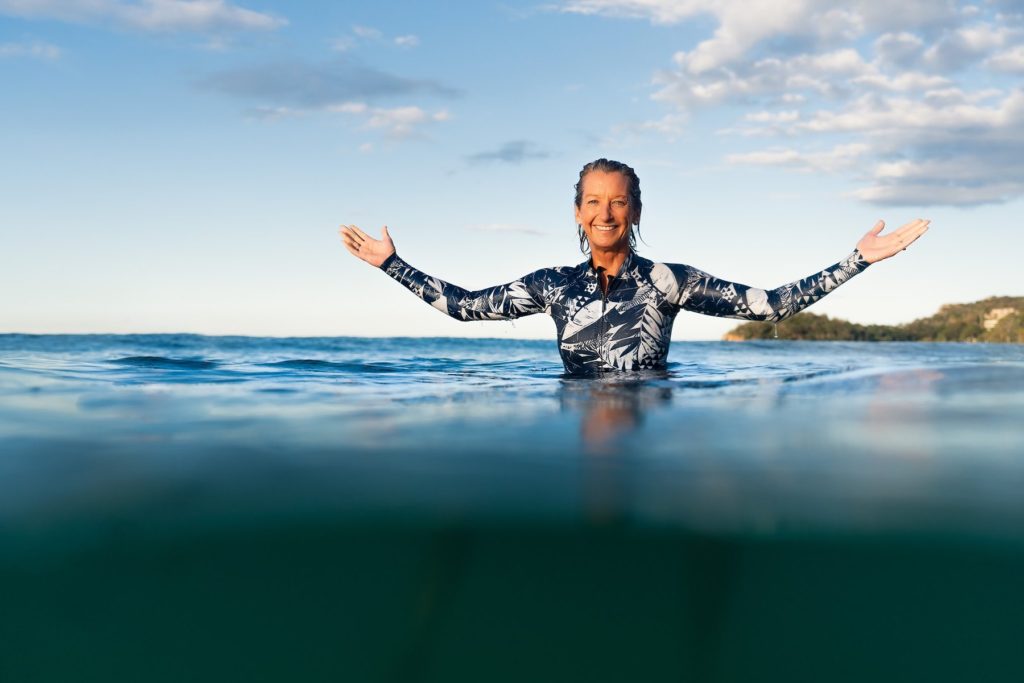Layne Beachley came dead last in every surfing competition she entered at the age of 14.
It’s hard to imagine that now, given the seven world titles she later went on to win and just how synonymous her name became with surfing internationally.
She started winning local titles at the age of 15, then joined the world tour at 18 only to find herself coming dead last again. She won her first world title at age 26, and then won another five in a row.
With six consecutive titles, she is the most successful surfer of all time (but she’s taken home significantly less prize and sponsorship money than the men).
Her seventh world title, one she says came from a very different place to the others and after a long process of healing, came three years after the sixth, in 2006. By that point, Layne was 36.
I spoke to Layne recently for The Women’s Agenda Podcast, to learn more about her mindset in winning these titles, as well as how she overcomes fear, her thoughts on how far gender equality has come for surfing and also her freshly launched Awake Academy, an online learning platform helping people to detach from fear and take control of their lives.
She shared what changed in the pivotal years between the “crushing defeats and wins” that she’s experienced. As a teenager coming last, it’d be easy to think pursing the sport at such a competitive level may not be for you. But Layne says she never let such defeats define or derail her, instead she used them to recalibrate and shift her mindset: at that point that meant pushing through the nerves she’d feel in competition.
Asked if the wins feel better having experienced the lows, she rejects any notion that success is something you ‘deserve’ having experienced failure or adversity.
“A lot of us are so invested in struggles that it makes us almost believe we deserve success when we finally achieve it.
“When we do achieve success after having crushing failures we celebrate that and think ‘yes I deserve this!’ I’ve learnt, especially when competing for my seventh world title, that victory can be sweet without the dissatisfaction or the sadness of defeat.”
Success can also have consequences on your perspective. After winning that first world title, Layne says she placed unrealistic expectations on herself to replicate the performance and get better and better. It cost her the quality of her relationships, friendships, her wellbeing and her health as she lived and competed in a constant space of fear.
“No one sees the shit you go through, they see the outcome and they think, ‘well that was easy’!”
Layne says her seventh world title was won from a place of love, rather than a place of the fear she’d experienced with the five of the six that came before it. In the interim period between world title No. 6 in 2003 and No. 7 in 2006, she experienced adrenal fatigue and had persistent injuries flaring up. She went on a deliberate mission to heal herself inside and out, exploring multiple forms of therapy.
“I had to detach from the fear and invest in love and trust in my ability to bring the best version of me to the water every day and detach from the outcome and focus on the joy of the process.”
Layne has also had the opportunity, especially through big wave surfing where she’s ridden waves a big as 50 feet, to examine fear in the context of life-threatening situations.
“I feel that my big wave exploits actually gave me a competitive advantage. It taught me to deal with enormous amounts of pressure, to stay calm, create a clear vision about what I need to do. It brought the best out of me. Even though it literally scared the shit out of me.
“As humans, we’re pretty simple, we remember things in threes. I broke down what are the most important three things today to focus on in order to achieve the outcome. The outcome will take care of itself if I follow this process.”
“Keep it simple. Focus on the process. When fear comes up, recognize it. ‘Yep I hear you but this is what I chose to focus on right now’.”
The opportunities for women in surfing have changed considerably in recent years, especially with the World Surf League paying female surfers the same prize money as their male counterparts from 2019. Layne has always been vocal on pushing for more gender equality in the sport, and even staged her own international surfing event for seven years, which became the richest event in women’s surfing.
She describes some of what she and other women experienced in surfing as a ‘shit show”, a challenging environment to prosper in where not only were they receiving less prize money, but that’d often be left to surf in substandard waves. They’d have events cancelled last minute. They experienced bullying, intimidation, harassment and all the stress that comes with all of the above.
The industry has made significant progress — the equal pay gap announcement was something Layne never expected to see in her lifetime. But she says there’s still work to do.
The industry, we hope, is resetting. It’s something Layne did with her own mindset around fear and success, and it’s something that much of the world is doing right now during the COVID-19 pandemic.
“I’ve referred to COVID as a triple E reset: Environmental, energetic and economic,” says Layne.
“The world right now needs more truth. More confidence and connections. More happiness, joy and beauty. No one else can bring that but you.”
We expand on all these topics and more in our podcast conversation. Listen below or on iTunes or Spotify.


